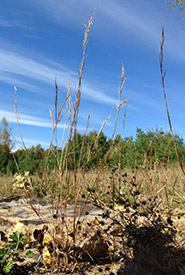Saint-Anicet — NCC protects a rare dune plant in the Montérégie: forked three-awned grass

Forked three-awned grass (Photo by NCC)
In the municipality of Saint-Anicet, on the south shore of Lac Saint-François (where the St. Lawrence widens, southwest of Montreal), lies a rare dune species fighting for survival: forked three-awned grass.
Times are tough for this little native plant, designated threatened in Quebec and endangered in Canada. It has earned these designations because of the limited availability of suitable habitat and its small range across the country. In Quebec, it is only found in a few places in the southwestern part of the upper St. Lawrence region, including on a Nature Conservancy of Canada (NCC) property, where it is competing for space with a population of red pine.
To give forked three-awned grass a helping hand, NCC will be carrying out a partial cutting operation in a red pine stand, which was planted around 15 years ago. The reason for this intervention is simple: the row plantation is species-poor, and the conifers are preventing the delicate grass from developing, since it only grows on sandy, open ground. It doesn’t do well in the shade of pine branches, or in accumulated plant residue on the ground, such as pine needles.
Forked three-awned grass is a unique and fragile plant that depends on natural disturbance processes to maintain an ideal environment; fires and strong winds limit the growth of trees and keep its habitat clear. When these conditions don’t occur often enough, human intervention may be necessary for the species’ survival.
This work by NCC could help other rare dune plants thrive, such as spotted beebalm and forked bluecurls. Once the cutting is complete, NCC will monitor several species in the targeted plot, including at-risk plants with a fighting chance of taking their rightful place.
Let’s protect and learn more about this little-known species!
This work has been made possible by the Partenariat pour les milieux naturels project, through which the Quebec government has granted NCC more than $53 million over four years.




